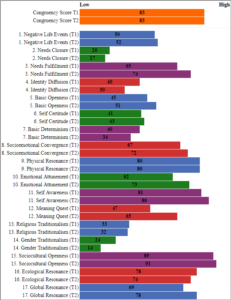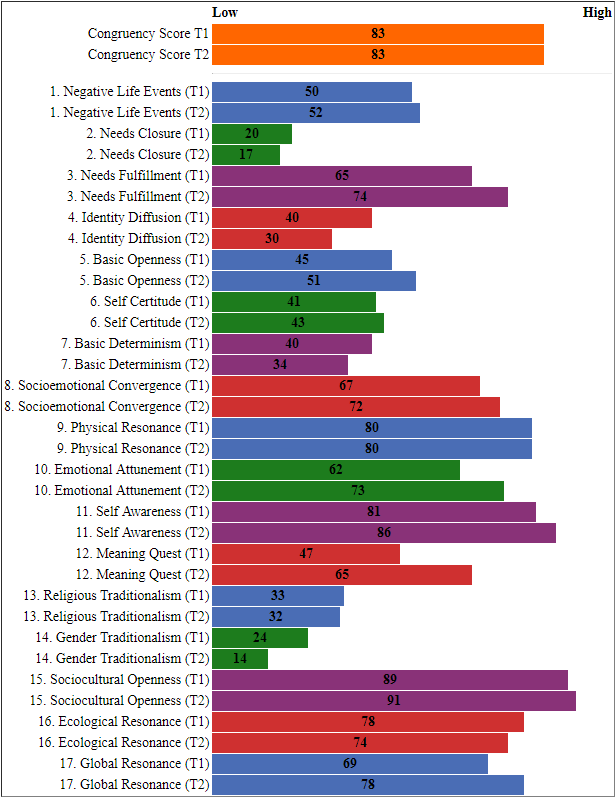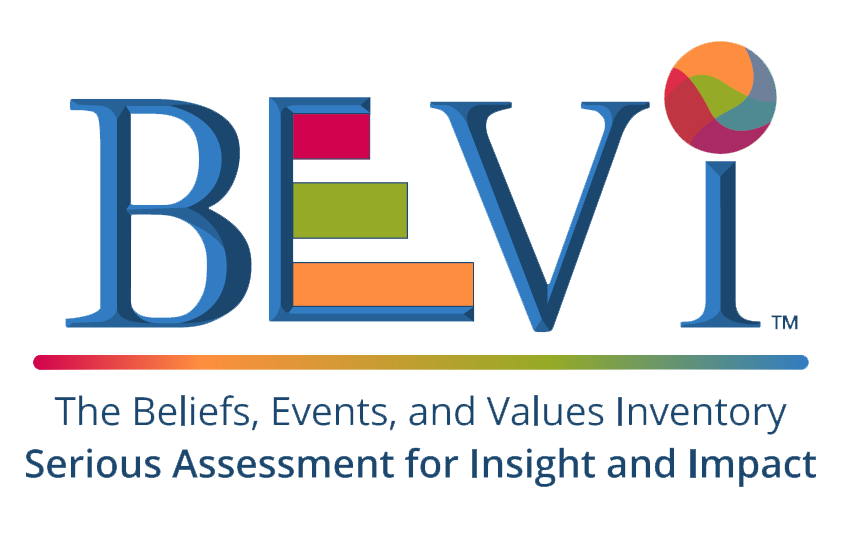BEVI Scales
 All versions of the BEVI consist of four interrelated components:
All versions of the BEVI consist of four interrelated components:
- a comprehensive set of demographic/background items that may be modified for particular projects
- a life history questionnaire, which is built into the survey
- two validity and seventeen “process” or construct scales
- three qualitative “experiential reflection” items
Validity scales include consistency and congruency. The 17 process scales cluster into seven domains:
| BEVI Domains | BEVI Scales |
| Formative Variables | Negative Life Events |
| Fulfillment of Core Needs | Needs Closure
Needs Fulfillment Identity Diffusion |
| Tolerance of Disequilibrium | Basic Openness
Self-Certitude |
| Critical Thinking | Basic Determinism
Socioemotional Convergence |
| Self Access | Physical Resonance
Emotional Attunement Self Awareness Meaning Quest |
| Other Access | Religious Traditionalism
Gender Traditionalism Sociocultural openness |
| Global Access | Ecological Resonance
Global Resonance |
I. Validity Scales
Consistency: the degree to which responses are consistent for differently worded items that are assessing similar or identical content (e.g., “People change all the time.” “People don’t really change.”).
Congruency: the degree to which response patterns correspond to that which would be predicted statistically (e.g., “I have real needs for warmth and affection.” “I take my own feelings very seriously.”).
II. Formative Variables
Negative Life Events: difficult childhood; parents were troubled; life conflict/struggles; many regrets (e.g., “I have had a lot of conflict with one or more members of my family.” “My family had a lot of problems with money.”).
III. Fulfillment of Core Needs
Needs Closure: unhappy upbringing/life history; conflictual/disturbed family dynamics; stereotypical thinking/odd explanations for why events happen as they do or why things are as they are (e.g., “I had a wonderful childhood.” “Some numbers are luckier than others.”).
Needs Fulfillment: open to experiences, needs, and feelings; deep care/sensitivity for self, others, and the larger world (e.g., “We should spend more money on early education programs for children.” “I like to think about who I am.”).
Identity Diffusion: indicates painful crisis of identity; fatalistic regarding negatives of marital/family life; feels “bad” about self and prospects (e.g., “I have gone through a painful identity crisis.” “Even though we expect them to be, men are not really built to be faithful in marriage.”).
IV. Tolerance of Disequilibrium
Basic Openness: open and honest about the experience of basic thoughts, feelings, and needs (e.g., “I don’t always feel good about who I am.” “I have felt lonely in my life.”).
Self Certitude: strong sense of will; impatient with excuses for difficulties; emphasizes positive thinking; disinclined toward deep analysis (e.g., “You can overcome almost any problem if you just try harder.” “If you play by the rules, you get along fine.”).
V. Critical Thinking
Basic Determinism: prefers simple explanations for differences/behavior; believes people don’t change/strong will survive; troubled life history (e.g., “AIDS may well be a sign of God’s anger.” “It’s only natural that the strong will survive.”).
Socioemotional Convergence: open, aware of self/other, larger world; thoughtful, pragmatic, determined; sees world in shades of gray, such as the need for self-reliance while caring for vulnerable others (e.g., “We should do more to help those who are less fortunate.” “Too many people don’t meet their responsibilities.”).
VI. Self Access
Physical Resonance: receptive to corporeal needs/feelings; experientially inclined; appreciates the impact of human nature/evolution (e.g., “I am a free spirit.” My body is very sensitive to what I feel.”).
Emotional Attunement: emotional, sensitive, social, needy, affiliative; values the expression of affect; close family connections (e.g., “I don’t mind displays of emotion.” “Weakness can be a virtue.”).
Self Awareness: introspective; accepts the complexity of self; cares for human experience/condition; tolerates difficult thoughts/feelings (e.g., “I am always trying to understand myself better.” “I have problems that I need to work on.”).
Meaning Quest: searching for meaning; seeks balance in life; resilient/persistent; highly feeling; concerned for less fortunate (e.g., “I think a lot about the meaning of life.” “I want to find a better sense of balance in my life.”).
VII. Other Access
Religious Traditionalism: highly religious; sees self/behavior/events as mediated by God/spiritual forces; one way to the “afterlife” (e.g., “Without religion there can be no peace.” “There is one way to heaven.”).
Gender Traditionalism: men and women are built to be a certain way; prefers traditional/simple views of gender and gender roles (e.g., “Women are more emotional than men.” “A man’s role is to be strong.”).
Sociocultural Openness: progressive/open regarding a wide range of actions, policies, and practices in the areas of culture, economics, education, environment, gender/global relations, politics (e.g., “We should try to understand cultures that are different from our own.” “There is too big a gap between the rich and poor in our country.”).
VIII. Global Access
Ecological Resonance: deeply invested in environmental/sustainability issues; concerned about the fate of the earth/natural world (e.g., “I worry about our environment.” “We should protect the land no matter who owns it.”).
Global Resonance: invested in learning about/encountering different individuals, groups, languages, cultures; seeks global engagement (e.g., “It is important to be well informed about world events.” “I am comfortable around groups of people who are very different from me.”).
IX. Experiential Reflection Items
The BEVI is a “mixed methods” measure in that both quantitative (i.e., scales) and qualitative (i.e., free response) items are asked during administration and used for purposes of interpretation (e.g., Coates, Hanson, Samuel, Ashe, & Cozen, 2016; Cozen, Hanson, Poston, Jones, & Tabit, 2016). The following three qualitative Experiential Reflection Items are included in the BEVI, and completed in written format at the conclusion of administration:
- First, please describe which aspect of this experience has had the greatest impact upon you and why?
- Second, is there some aspect of your own “self” or “identity” (e.g., gender, ethnicity, sexual orientation, religious or political background, etc.) that has become especially clear or relevant to you or others as a result of this experience?
- Third, what have you learned and how are you different now?
There are a number of types of reports available on BEVI data so that researchers and practitioners can analyze group results in various ways (including intragroup variation). An example of the simplest of these reports, depicting pretest (T1) and posttest (T2) aggregate group mean results for each scale, is pictured below.

Example Time 1/Time 2 report snapshot
